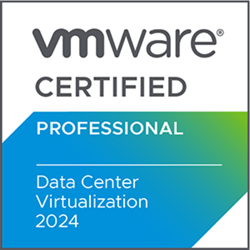Obiettivi | Certificazione | Contenuti | Tipologia | Prerequisiti | Durata e Frequenza | Docenti | Modalità di Iscrizione | Calendario

Il Corso VMware vSphere: Install, Configure, Manage [V8] si focalizza sull’installazione, configurazione e gestione di VMware vSphere 8, che include VMware ESXi™ 8 e VMware vCenter® 8. Durante il corso, i partecipanti acquisiranno le competenze necessarie per amministrare un’infrastruttura vSphere per organizzazioni di qualsiasi dimensione, rendendo il corso la base per la maggior parte delle tecnologie VMware nel data center definito dal software.
Nel corso verranno trattate diverse tecnologie, tra cui la virtualizzazione, la configurazione e la gestione di reti vSphere, lo storage vSphere e l’implementazione e gestione di macchine virtuali. I partecipanti impareranno anche a configurare e gestire cluster vSphere e a gestire il ciclo di vita di vSphere. Il corso copre inoltre temi come l’interazione di vSphere con CPU, memoria, reti, storage e GPU, le migrazioni di macchine virtuali e l’utilizzo di vSphere DRS e vSphere HA per gestire cluster e risorse. I partecipanti avranno l’opportunità di lavorare con strumenti come VMware vSphere® Lifecycle Manager™ e vCenter Update Planner per aggiornare e gestire i componenti del sistema. Il corso contribuisce alla preparazione dell’esame di Certificazione VMware Certified Professional Data Center Virtualization (VCP-DCV 2024).
Contattaci ora per ricevere tutti i dettagli e per richiedere, senza alcun impegno, di parlare direttamente con uno dei nostri Docenti (Clicca qui)
oppure chiamaci subito al nostro Numero Verde (800-177596)
Obiettivi del corso
Di seguito una sintesi degli obiettivi principali del Corso VMware vSphere: Install, Configure, Manage [V8]:
- Installazione e configurazione di ESXi e vCenter.
- Creazione e gestione di reti virtuali con switch standard e distribuiti.
- Configurazione e gestione di datastores con tecnologie di storage supportate da vSphere.
- Uso di vSphere Client per creare macchine virtuali, template, cloni e snapshot.
- Configurazione e gestione di cluster vSphere per alta disponibilità e distribuzione delle risorse.
Certificazione del corso
Esame VMware Certified Professional Data Center Virtualization (VCP-DCV 2024); Questo Esame valuta la competenza nell’implementazione e gestione di VMware vSphere, comprese le architetture ESXi e vCenter Server. Si concentra sui concetti di storage, reti e cluster, incluso il dettaglio su protocolli di storage e tipi di datastore, oltre a configurazioni avanzate di storage e politiche. L’esame copre anche la configurazione di switch distribuiti e standard, la gestione di vSphere Distributed Switch, e l’ottimizzazione delle risorse di rete. Viene anche esplorato il Lifecycle Manager di vSphere, la sicurezza delle macchine virtuali, l’identità federata e la gestione di vSphere con Tanzu. È incluso l’uso di VMware vSphere in data center software-defined, la configurazione di vSphere Trust Authority e l’ottimizzazione delle prestazioni, oltre a compiti amministrativi e operativi come la creazione e gestione di snapshot di macchine virtuali.
Contenuti del corso
Module 1: Course Introduction
- Introductions and course logistics
- Course objectives
Module 2: vSphere and Virtualization Overview
- Explain basic virtualization concepts
- Describe how vSphere fits in the software-defined data center and the cloud infrastructure
- Recognize the user interfaces for accessing vSphere
- Explain how vSphere interacts with CPUs, memory, networks, storage, and GPUs
Module 3: Installing and Configuring ESXi
- Install an ESXi host
- Recognize ESXi user account best practices
- Configure the ESXi host settings using the DCUI and VMware Host Client
Module 4: Deploying and Configuring vCenter
- Recognize ESXi hosts communication with vCenter
- Deploy vCenter Server Appliance
- Configure vCenter settings
- Use the vSphere Client to add and manage license keys
- Create and organize vCenter inventory objects
- Recognize the rules for applying vCenter permissions
- View vCenter logs and events
Module 5: Configuring vSphere Networking
- Configure and view standard switch configurations
- Configure and view distributed switch configurations
- Recognize the difference between standard switches and distributed switches
- Explain how to set networking policies on standard and distributed switches
Module 6: Configuring vSphere Storage
- Recognize vSphere storage technologies
- Identify types of vSphere datastores
- Describe Fibre Channel components and addressing
- Describe iSCSI components and addressing
- Configure iSCSI storage on ESXi
- Create and manage VMFS datastores
- Configure and manage NFS datastores
Module 7: Deploying Virtual Machines
- Create and provision VMs
- Explain the importance of VMware Tools
- Identify the files that make up a VM
- Recognize the components of a VM
- Navigate the vSphere Client and examine VM settings and options
- Modify VMs by dynamically increasing resources
- Create VM templates and deploy VMs from them
- Clone VMs
- Create customization specifications for guest operating systems
- Create local, published, and subscribed content libraries
- Deploy VMs from content libraries
- Manage multiple versions of VM templates in content libraries
Module 8: Managing Virtual Machines
- Recognize the types of VM migrations that you can perform within a vCenter instance and across vCenter instances
- Migrate VMs using vSphere vMotion
- Describe the role of Enhanced vMotion Compatibility in migrations
- Migrate VMs using vSphere Storage vMotion
- Take a snapshot of a VM
- Manage, consolidate, and delete snapshots
- Describe CPU and memory concepts in relation to a virtualized environment
- Describe how VMs compete for resources
- Define CPU and memory shares, reservations, and limits
Module 9: Deploying and Configuring vSphere Clusters
- Create a vSphere cluster enabled for vSphere DRS and vSphere HA
- View information about a vSphere cluster
- Explain how vSphere DRS determines VM placement on hosts in the cluster
- Recognize use cases for vSphere DRS settings
- Monitor a vSphere DRS cluster
- Describe how vSphere HA responds to various types of failures
- Identify options for configuring network redundancy in a vSphere HA cluster
- Recognize vSphere HA design considerations
- Recognize the use cases for various vSphere HA settings
- Configure a vSphere HA cluster
- Recognize when to use vSphere Fault Tolerance
Module 10: Managing the vSphere Lifecycle
- Enable vSphere Lifecycle Manager in a vSphere cluster
- Describe features of the vCenter Update Planner
- Run vCenter upgrade prechecks and interoperability reports
- Recognize features of VMware vSphere® Lifecycle Manager™
- Distinguish between managing hosts using baselines and managing hosts using images
- Describe how to update hosts using baselines
- Describe ESXi images
- Validate ESXi host compliance against a cluster image and update ESXi hosts
- Update ESXi hosts using vSphere Lifecycle Manager
- Describe vSphere Lifecycle Manager automatic recommendations
- Use vSphere Lifecycle Manager to upgrade VMware Tools and VM hardware
Tipologia
Corso di Formazione con Docente
Docenti
I docenti sono Istruttori Autorizzati VMware e in altre tecnologie IT, con anni di esperienza pratica nel settore e nella Formazione.
Infrastruttura laboratoriale
Per tutte le tipologie di erogazione, il Corsista può accedere alle attrezzature e ai sistemi presenti nei Nostri laboratori o direttamente presso i data center del Vendor o dei suoi provider autorizzati in modalità remota h24. Ogni partecipante dispone di un accesso per implementare le varie configurazioni avendo così un riscontro pratico e immediato della teoria affrontata. Ecco di seguito alcuni scenari tratti dalle attività laboratoriali:
![Corso VMware vSphere VCP-DCV 2023 [V8]](https://www.vegatraining.eu/wp-content/uploads/2023/12/Corso-VMware-vSphere-VCP-DCV-2023-V8.jpg)
Dettagli del corso
Prerequisiti
- Si consiglia la partecipazione al Corso CompTIA A+ o possedere competenze equivalenti.
Durata del corso
- Durata Intensiva 5gg;
Frequenza
Varie tipologie di Frequenza Estensiva ed Intensiva.
Date del corso
- Corso VMware vSphere: Install, Configure, Manage [V8] (Formula Intensiva) – 09/09/2024 – 9:00 – 17:00 (TD SYNNEX)
- Corso VMware vSphere: Install, Configure, Manage [V8] (Formula Intensiva) – 18/11/2024 – 9:00 – 17:00 (TD SYNNEX)
Modalità di iscrizione
Le iscrizioni sono a numero chiuso per garantire ai tutti i partecipanti un servizio eccellente.
L’iscrizione avviene richiedendo di essere contattati dal seguente Link, o contattando la sede al numero verde 800-177596 o inviando una richiesta all’email [email protected].


